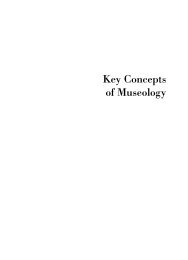ISS 25 (1995).pdf - The International Council of Museums
ISS 25 (1995).pdf - The International Council of Museums
ISS 25 (1995).pdf - The International Council of Museums
You also want an ePaper? Increase the reach of your titles
YUMPU automatically turns print PDFs into web optimized ePapers that Google loves.
) What is a museum?<br />
That is a recurrent question within our Committee on Museology. We may<br />
consider "museum" as a permanent institution, as most museum pr<strong>of</strong>essionals in the world still<br />
do. Coming from the latin institutione, it means a thing that has been created , instituted ,<br />
established, socially recognized as such. To institutions we attribute the character <strong>of</strong> relative<br />
permanence - and their are usually identifyed by the values <strong>of</strong> their codes <strong>of</strong> action, some <strong>of</strong><br />
them expressed as laws. Being a permanent institution, the museum would be an established<br />
thing , continually existing within the system <strong>of</strong> values <strong>of</strong> a society, and having specific codes.<br />
Under this concept, "training for museum awareness" means qualifying somebody to work in a<br />
specific type <strong>of</strong> institution - thus training being based on information about specific skills to<br />
administer, document, retrieve, preserve, exhibit, garantee security, survey the audience,<br />
etc., etc. It may also mean giving a background about the conceptual frames into which the<br />
museum develops its action. (This is more or less what museum training programs used to do up<br />
to 20 years ago).<br />
But the abovementioned experiences with community action have brought about<br />
the relativization <strong>of</strong> the museum concept. A holistic approach has made possible the creation <strong>of</strong><br />
concepts such as the total museum (musee integral), the ecomuseum , the inner museum , the<br />
museum <strong>of</strong> the biosphere. Development <strong>of</strong> technology and <strong>of</strong> Semiotics has given way to<br />
concepts such as the virtual museum. With so many facets <strong>of</strong> the concept, it became difficult to<br />
understand the museum as institution, now that it has incorporated the capacity to change. In<br />
the present days, it is already accepted that the concept <strong>of</strong> Museum varies according to the<br />
different world visions <strong>of</strong> societies, in time and in space.<br />
So today, when we talk about training for museum awareness we usually refer to<br />
the analytic study <strong>of</strong> such concepts, to the investigation <strong>of</strong> museum as phenomenon or to the<br />
idea <strong>of</strong> Museum, which lead to the understanding <strong>of</strong> Museology either as philosophy or as a<br />
scientific discipline.<br />
c) What is a community?<br />
That's another complicated question. When talking about ·communities· we<br />
usually take for granted that community is a group <strong>of</strong> people, either sharing the same tenritory or<br />
the same cultural identity or some other combination <strong>of</strong> cultural and/or social characters that<br />
make them identifiable as a group. We seldom remember that plants and animals form<br />
biological communities, or that biology refers to communities <strong>of</strong> microbes as well. We usually<br />
forget the nuclear family as a basic community, or the population <strong>of</strong> the world as planet Earth<br />
community, to which UNESCO and ICOM so frequently refer.<br />
Since this is not a meeting on terminology, let us consider ·community· in its basic social<br />
sense: a group <strong>of</strong> people sharing common traits and pattems <strong>of</strong> behavior.<br />
Also for purposes <strong>of</strong> study, let us substitute the word "training· for individual or group<br />
education and qualification.<br />
Now we come back to training and <strong>of</strong>fer you a second issue to reflection:<br />
173
















